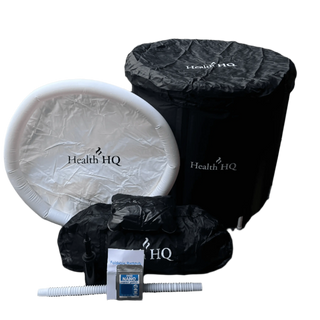The Chill Factor: How Ice Baths Can Boost Mental Health
In recent years, ice baths have surged in popularity among athletes, biohackers, and wellness enthusiasts alike. Known primarily for their physical benefits—such as muscle recovery and reduced inflammation—ice baths are now also being recognized for their potential to improve mental health. In this blog post, we’ll explore the science behind ice baths, how they can impact mental well-being, and tips for incorporating this practice safely into your routine.
What Are Ice Baths?
An ice bath is a form of cold water immersion therapy in which a person submerges their body (or part of it) in ice-cold water—typically between 50°F and 59°F (10°C to 15°C)—for a short period, usually between 5 to 15 minutes. Traditionally used by athletes to reduce muscle soreness after intense workouts, ice baths are now gaining traction as a method to manage stress, anxiety, and depression.
The Science Behind Cold Exposure and Mental Health
1. Activation of the Nervous System
When your body is exposed to cold water, it triggers a “fight-or-flight” response. This response is mediated by the sympathetic nervous system, leading to the release of endorphins—the body’s natural painkillers and mood enhancers. Endorphins help reduce feelings of stress and anxiety, leaving you with a sense of euphoria once you emerge from the cold.
2. Enhanced Stress Resilience
Regular exposure to controlled stressors, such as cold water immersion, can help train the body to handle other stressors more effectively. This concept, known as hormesis, suggests that small doses of stress (in this case, the cold) can build resilience over time. Ice baths may help lower overall cortisol levels, which can reduce chronic stress and improve your mood.
3. Improved Mood Regulation
Several studies have found that cold exposure can increase the production of neurotransmitters like norepinephrine. This chemical plays a role in mood regulation and alertness. Increased norepinephrine levels can help alleviate symptoms of depression and enhance overall mental clarity. Additionally, the practice of enduring the discomfort of an ice bath can foster a sense of accomplishment and self-mastery, further boosting self-esteem and mental resilience.
4. Mindfulness and Mental Clarity
Taking an ice bath requires you to be fully present in the moment. The intense cold forces you to focus on your breathing and the sensations in your body. This mindful awareness can help clear your mind of negative thoughts, similar to the benefits experienced during meditation. Many practitioners report a meditative quality after an ice bath, feeling both relaxed and invigorated.
Potential Mental Health Benefits of Ice Baths
Stress Reduction
Regularly taking ice baths can condition your body to better manage stress. As you become accustomed to the cold, your body’s stress response becomes more controlled. This can translate to everyday life, making it easier to navigate stressful situations without becoming overwhelmed.
Mood Enhancement
The release of endorphins and neurotransmitters during cold exposure can create a natural “high,” improving your overall mood. Many users report feeling more energetic, focused, and positive after a session.
Improved Sleep
The combination of stress reduction and increased production of mood-enhancing chemicals can lead to better sleep quality. Many who practice cold therapy find that they fall asleep faster and enjoy a more restorative night’s sleep.
Increased Mental Resilience
By regularly challenging yourself with the discomfort of an ice bath, you build mental toughness and resilience. This improved capacity to handle discomfort can spill over into other areas of your life, helping you face challenges with greater confidence.
How to Safely Incorporate Ice Baths into Your Routine
Before diving into an ice bath, it’s essential to take precautions to ensure a safe and beneficial experience:
-
Consult Your Doctor:
If you have any pre-existing health conditions, such as cardiovascular issues or respiratory problems, talk to your doctor before beginning cold exposure therapy. -
Start Gradually:
Begin with shorter durations or slightly warmer water to allow your body to acclimate. As you build tolerance, gradually lower the temperature and extend your time in the bath. -
Set a Timer:
Limit your initial sessions to 3–5 minutes, and slowly work up to 10–15 minutes over several sessions. Overdoing it can lead to hypothermia or other complications. -
Focus on Your Breathing:
Controlled breathing is crucial during an ice bath. Deep, slow breaths help mitigate the shock of the cold and maintain calmness. -
Warm Up Afterwards:
After the ice bath, warm up gradually. Wrap yourself in a towel or a blanket and consider drinking a warm beverage to help your body return to its normal temperature. -
Be Consistent, Not Extreme:
The benefits of ice baths accumulate over time with regular practice. There’s no need to push your body to the extreme; consistency is key to reaping long-term mental health benefits.
Final Thoughts
While ice baths may not be a cure-all for mental health issues, they offer a promising, natural approach to managing stress, boosting mood, and building resilience. The combination of physical shock, endorphin release, and mindful focus creates a unique mental reset button that many find invaluable in today’s high-stress world.
If you’re curious about exploring new avenues for improving your mental health, consider giving ice baths a try. As with any wellness practice, listen to your body, proceed with caution, and celebrate the small victories along the way. With time, you may discover that the chill factor is just what you need to warm your mind.
Have you tried ice baths for mental health? Share your experiences and tips in the comments below!
Have a look at our range of ice baths and ice bath accessories








